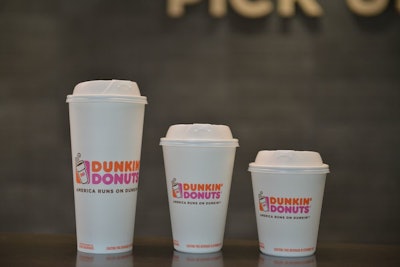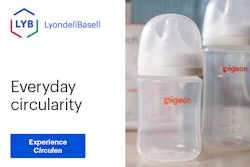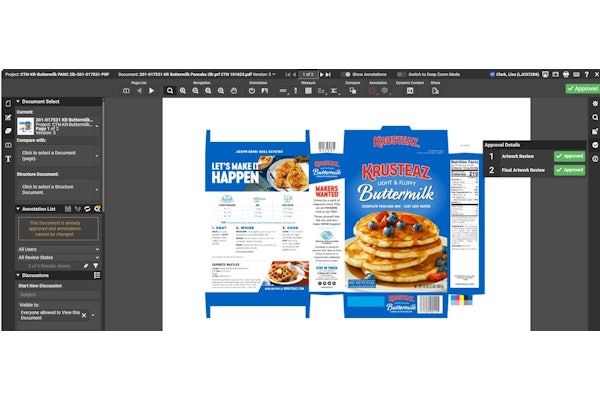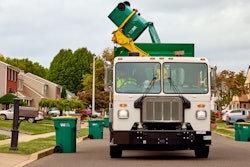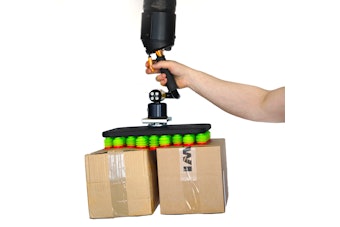As part of its commitment to serve both people and the planet responsibly, Dunkin’ Donuts has announced plans to eliminate all polystyrene foam cups in its global supply chain beginning in spring 2018, with a targeted completion date of 2020. In U.S. restaurants, Dunkin’ Donuts will replace the foam cup with a new, double-walled paper cup. The majority of Dunkin’ Donuts’ international markets are currently using paper cups, and the brand will work with its franchisees to eliminate foam cups from the remaining international markets by the 2020 goal.
The move complements Dunkin’ Donuts’ earlier commitments in the U.S. to have 80% of fiber-based consumer-facing packaging certified to the Sustainable Forestry Initiative Standard by the end of this year; eliminate artificial dyes from its menu; build new, more energy-efficient restaurants; and partner with the Rainforest Alliance to source certified coffee.
The new, double-walled paper cup is already in use at Dunkin’ Donuts’ next generation concept store, which opened in mid-January 2018 in the company’s birthplace of Quincy, MA. It will be introduced at all Dunkin’ Donuts restaurants in New York City and California in spring 2018, and will be phased in across the U.S. as supplier manufacturing capabilities ramp up.
The double-walled paper cup is made with paperboard certified to the SFI Standard and will feature the current Dunkin’ Donuts reclosable lid. The new cup will come in four sizes—small, medium, large, and extra-large—and will be used for all of the brand’s hot beverages, including coffee, lattes, macchiatos, tea, and hot chocolate. With heat retention properties equal to the company’s foam cup, the new double-walled paper cup will keep beverages hot while keeping hands cool, without the need for a sleeve.
According to Karen Raskopf, Chief Communications and Sustainability Officer, Dunkin’ Brands, “With more than 9,000 Dunkin’ Donuts restaurants in the U.S. alone, our decision to eliminate foam cups is significant for both our brand and our industry. We have a responsibility to improve our packaging, making it better for the planet while still meeting the needs of our guests. Transitioning away from foam has been a critical goal for Dunkin’ Donuts U.S., and with the double-walled cup, we will be able to offer a replacement that meets the needs and expectations of both our customers and the communities we serve.”
In 2011, Dunkin’ Donuts announced that its number-one sustainability goal was to find an environmentally friendlier coffee cup. Over the past several years, the brand has worked extensively to find a suitable replacement for the foam cup that met criteria for performance, environmental impact, and cost. Dunkin’ Donuts’ transition to paper cups will remove nearly 1 billion foam cups from the waste stream annually.
Dunkin' Donuts says it remains committed to sustainable packaging and will continue to explore additional opportunities to increase recycled or certified content for other consumer-facing packaging. Since 2005, the brand has made a number of packaging improvements in the U.S., including:
- 2005: Began sourcing a four-cup carrier made of recycled newsprint.
- 2009: Transitioned to napkins made with 100% recycled paper and added recycled content to espresso sleeves, cup carriers, and Box O’ Joe®.
- 2014: Transitioned to bagel bags made with 100% recycled paper, saving an estimated 20 million pounds of virgin paper per year.
- 2015: Began transition of the lids for cold beverage cups from PET to recyclable #5 polypropylene, a change that will take 500,000 pounds of material out of the waste stream per year once completed in summer 2018.
- 2016: Issued a new Sustainable Pulp and Paper Sourcing policy with a goal to source paperboard certified to the SFI Standard for 80% of its consumer-facing fiber-based packaging by the end of 2018.
